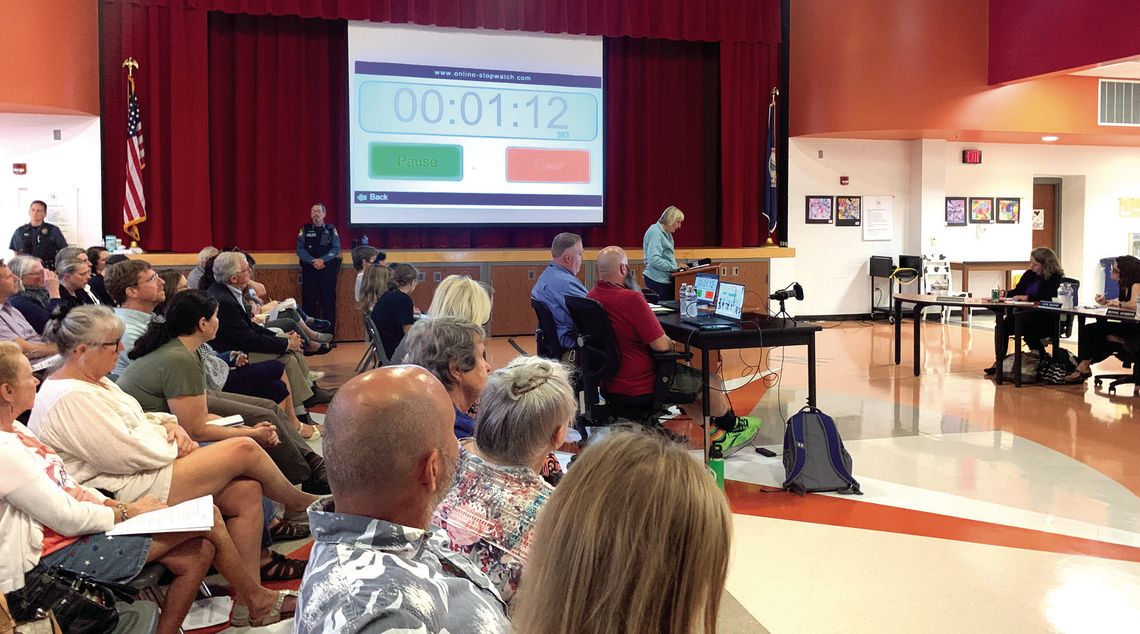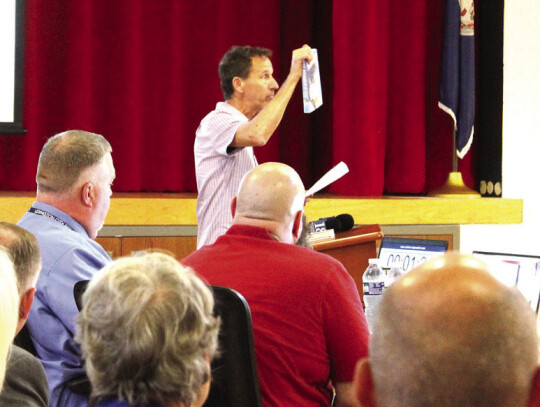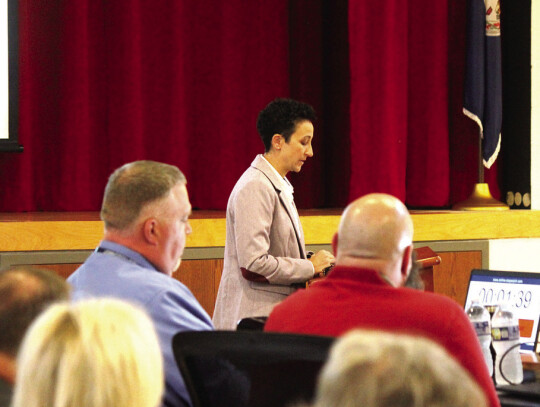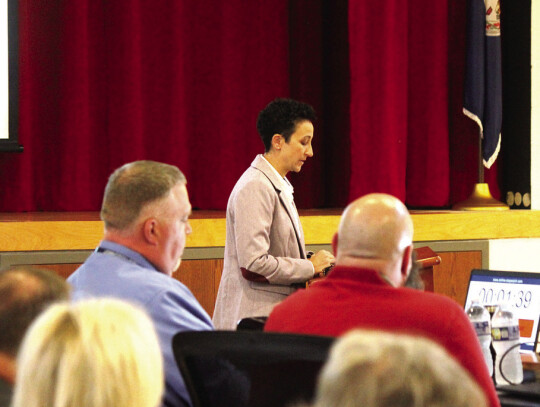The Lexington School Board was presented with drafts of new policies for library and instructional materials and complaint protocols at its Oct. 3 meeting, following the controversial decision to remove multiple books from the middle school library.
“As you might imagine, today is not a typical School Board meeting, in that our attendance usually averages between two and five people,” Board Chair Timothy Diette told the attendees crowded into Lylburn Downing Middle School’s cafeteria.
More than 20 citizens submitted public comments, either online or at the meeting, speaking both for and against the book “Kiss Number 8,” and responding to the draft policies presented.
“In all sincerity, I’m glad you’re here. I’m glad so many of you have signed up to provide input, and so many of you have already provided your input to the board,” Diette said. “It’s how we go about our work, to be informed about the view of our diverse community.” -“Several weeks ago our school administration were alerted to some concerns about some titles that were in the middle school library here at Lylburn Downing,” Superintendent Rebecca Walters explained to the Board at the beginning of the meeting.
In response to an open letter to the School Board spread online last month, the division chose to remove “Kiss Number 8,” a graphic novel, and “It’s Perfectly Normal: Changing Bodies, Growing Up, Sex, and Sexual Health,” from Lylburn Downing Middle School’s library.
“After reviewing the books, and doing some research, we felt that these particular books were not appropriate for the middle school library, for the age and development of our students, for content that we found to be explicit in those titles,” said Walters.
She presented drafts of new policies on library and instructional materials and outlined new protocols for complaints about, and removal of, those materials, to be voted on at the next meeting of the School Board.
These include policies about the selection of library materials, which will primarily fall to the school’s librarian, using the American Library Association’s guidelines.
Ten selection criteria are laid out for Lexington City Schools, which include “maintain collection based on the academic programs,” “include materials that will allow students to develop as critical thinkers, through presenting multiple perspectives on controversial topics,” and “support a culturally responsive environment by including materials that encompass a wide range of cultures, backgrounds, and perspectives.”
Criteria for removing items from the library are also included. According to these, books or materials can be removed from a school’s library because of poor physical condition, if they have become outdated, or because of content.
“Materials may not be removed solely for the ideas expressed therein; however, materials may be removed if they are determined not to be age appropriate for the intended audience due to content that is excessively graphic, vulgar, obscene, violent, or sexually explicit,” according the policy.
Sexually explicit materials are prohibited in both elementary and middle school libraries, following Virginia code, which defines sexually explicit as, “any description of or any picture, photograph, drawing, motion picture film, digital image or similar visual representation depicting sexual bestiality, a lewd exhibition of nudity, sexual excitement, sexual conduct or sadomasochistic abuse.”
The proposed policies would differentiate instructional materials, those used in classrooms or for school assignments, from library materials.
Under current Lexington policy, which will remain in place, if sexually explicit instructional materials are to be used in a classroom, the teacher assigning them will notify parents 30 days in advance. Parents may then opt-out, or ask that their child receive a different assignment or materials.
“Most complaints can and should be resolved at the building level through informal inquiry and discussions with principals and/or teachers,” reads the policy now, but it includes draft complaint forms, one for instructional materials, another for library materials. For either, a complaint form would be filed with the school, then reviewed by the principal and the teacher (for instructional materials) or librarian (for library materials).
If both agree, the book or material can be removed without going through a formal review committee. If they do not, a committee will be formed to make the decision, which can be appealed to the superintendent, then the School Board.
The decision made at the highest level will stand for four years. -“For the past several weeks, we have been hearing from and listening to input from parents, grandparents, faculty, community members, who have, as you might imagine, a wide variety of input on this particular issue,” Walters said.
“It is important that we have a community that is engaged in our schools, in the work that’s happening in our classrooms, in our buildings, and in our greater community, and we value the input that you have offered to us.”
Several speakers last Tuesday night directly addressed the letter that originally called for the book’s removal, which Elizabeth Braman, a mother with five students in the Lexington school system and a teacher at Waddell Elementary, wrote to the School Board last month.
“In the letter the author uses a dog whistle, coded or suggestive language meant to go under the radar of most people, and to garner political support in those that hear it,” Margaret Swisher told the Board.
“When she said that these books chosen by our school librarian are ‘grooming’ them, she was hoping to incite ire in those reading this message, by implying that it was written by a sexual predator. This personal attack is unnecessary and caused harm,” she said. “I am appalled that the author of the letter or anyone in our community would cause this unjust harm. I’m addressing it because I feel we must point out such actions in order to stop them.”
Stephen Landgraf also noted the tone of the public debate, saying he was worried about its effects on students.
“In general, I’m worried about the rhetoric that’s been flying around, the attacks that are going around. Firstly, for its effects of staff, and the effect on students who are hearing this and thinking, is ‘my identity the result of something other than who I am?’ I’m also worried about the chilling effect it might have on selecting books into the library in the first place.”
Despite these concerns, Landgraf felt that the policies brought before the Board were a reasonable compromise.
“Middle school, like you said, is a gray zone; it’s tough. You can make your judgment, we can make our judgment. I think the policy you’ve proposed is a good way of balancing those two things,” he said.
“It’s not perfect; you can’t perfectly protect your kids from being exposed to things that you don’t want them to be exposed to,” he continued. “If my daughter wants to check out some things from the library that tell her some things about what she may be going through, her friends may be going through, the world may be going through, that a professional has decided that she’s ready for, I would love for her to be able to check that out of the library. ”
Braman herself spoke at the meeting, thanking others for their input and reiterating her feelings about library policies.
“I’m grateful you’re here,” she said. “In all of this discussion what I’ve sincerely wanted is for people to make informed choices. I want everyone to understand what is going on.”
“I am grateful that this book has been removed and hope that it will stay this way. I will always question the judgment and intentions of anyone who seeks otherwise. Trust has been lost, and transparency is needed,” she said. “I hope the school will continue this newfound process in terms of review, and find the courage to choose wisely, and hold yourselves accountable.”
Elizabeth Cosvar-Wyman, herself a librarian, shared her research into Lylburn Downing’s catalogue.
“I live and work in Lexington, I’m a parent, and I’m a librarian. I’ve researched the claims that have come out about our middle school library recently, and I’d like to add that your library catalogue is fully searchable online, fully transparent to anyone,” she said.
“I did a little research in your catalogue. Thirty-three books, approximately, for the key word search for sexuality; 31 for gender; war, 167, for teenagers, 300; and science, 469. Sixty items include the word Christianity, one atheism, and two Islam. Thirty sexuality books compared to almost 500 science books. Based on these numbers, contrary to recent comments that I’ve read, you can see that the library has not been flooded by books focusing on sexuality, that there’s no prevalence of sexualized material, and that there has been professional oversight.”
Chris Gavaler, a Washington and Lee professor, spoke against the removal of “Kiss Number 8,” noting that the book would not, under the new guidelines, be considered sexually explicit.
“This is not sexually explicit. This is not excessively vulgar and obscene,” he said. “If you read the novel, you would understand the context of the one and a half pages that were taken out of context to make this sound like an anti-Christian, vulgar book,” he said. “By this document, this draft, [“Kiss Number 8”] belongs in your library.”
David Ryan shared his support of the letter, and of the new policies.
“I come here in support of the original letter, in support of the school’s decision on these particular books in this particular library, and of this policy review in general. I agree with previous comments that individual preferences should not hold dictatorship over our school policy in general, or library in particular,” he said.
“Removing a book that does not meet these criteria is not trampling the rights of those who want to keep it, but rather is a sign that something went wrong by bringing in material that did not have consensus of the community in the first place. A better system of review could help going forward,” he said.
Ryan Braman was also in favor of the removal of “Kiss Number 8,” which he called “inappropriate to the eyes and the minds of most, if not all,” but urged the Board remain mindful of book selection with its new policies.
“I know you guys are scrambling right now to tamp down this firestorm, scrambling to write a policy that you think will help. I hope you put as much energy into trying to determine how books are brought into the library in the first place,” he said. “Don’t be so busy trying to put out the fires that you don’t focus on how the fires started to begin with.”
Another parent, Brent Hierman, communicated his concerns that the proposed policies would allow little recourse to those who disagree with a book’s removal.
“While I agree that not all books are appropriate for all age levels, I think we need to be quite cautious and judicious about taking books away from the library. From the presentation here tonight, I have all sorts of questions about sexually explicit, what that means,” he said.
“And I recognize that reasonable people can disagree about things, which is why, I agree with some of the comments already made, that we have to be careful, about allowing a review process after a book has been recalled. Because someone could read this and say it’s sexually explicit, although — in my reading — I don’t see how.”
He suggested the policies include provisions for challenging withdrawal of a book.
“I should be able to challenge that removal, so it has another opportunity to be seen again. I’m just worried that we’re empowering a heckler’s veto through this process, which essentially what we did. We’re not allowing for reasonable, professional people to use their judgment, like librarians use their judgment, to decide what is appropriate or not.” -The policies presented last week are set to be voted on at the school board’s Nov. 7 meeting.
Until then, said Board Chair Diette, they remain open to citizen comments.
“If you do not get a chance today, you can provide comment over the next month, to the School Board, the school administrators, about what action you are hoping we would take, and to continue to shape those different policies in the future.”






